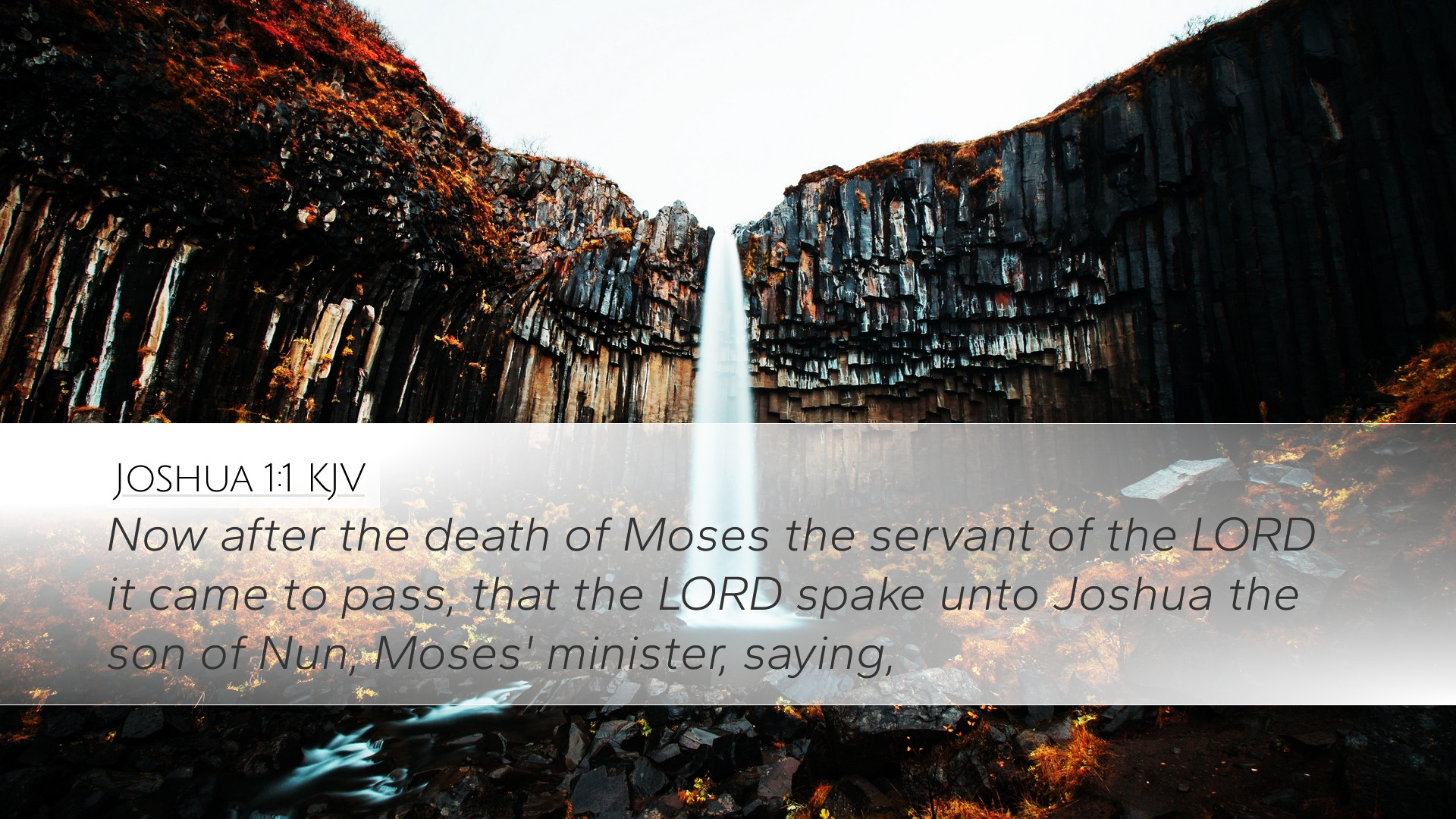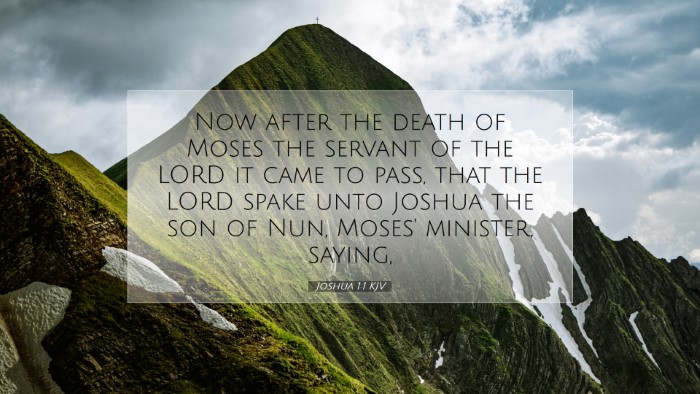Old Testament
Genesis Exodus Leviticus Numbers Deuteronomy Joshua Judges Ruth 1 Samuel 2 Samuel 1 Kings 2 Kings 1 Chronicles 2 Chronicles Ezra Nehemiah Esther Job Psalms Proverbs Ecclesiastes Song of Solomon Isaiah Jeremiah Lamentations Ezekiel Daniel Hosea Joel Amos Obadiah Jonah Micah Nahum Habakkuk Zephaniah Haggai Zechariah MalachiJoshua 1:1
Joshua 1:1 KJV
Now after the death of Moses the servant of the LORD it came to pass, that the LORD spake unto Joshua the son of Nun, Moses' minister, saying,
Joshua 1:1 Bible Commentary
Commentary on Joshua 1:1
Joshua 1:1 begins a significant transition in the history of Israel. After the death of Moses, this verse marks the beginning of Joshua's leadership, heralding a new phase in Israel's journey towards the Promised Land.
Contextual Background
This verse is set against the backdrop of the Israelites' prolonged journey through the wilderness. Their leader, Moses, who had brought them out of slavery in Egypt, has died. The nation, thus, finds itself at a critical juncture as it stands on the brink of entering Canaan.
1. The Leadership Transition
Matthew Henry emphasizes the importance of leadership during transitions. He notes that after Moses' death, Joshua is appointed as the new leader. This not only reflects God's sovereignty but also highlights the continuity of God's plan for Israel. Joshua, having been Moses' aide, was well-prepared to take on this significant role.
Insight on Leadership
Henry points out that Joshua’s rise indicates that God uniquely equips His chosen leaders. Joshua’s experiences under Moses equipped him with the wisdom and courage necessary for the task ahead. Albert Barnes echoes this sentiment, suggesting that the transition of leadership was divinely orchestrated, ensuring that God's work among His people would continue without interruption.
2. The Significance of God’s Call
In Joshua 1:1, God speaks to Joshua directly after Moses' death. This divine address signifies the importance of Joshua’s mission and assures him of God's presence. Adam Clarke highlights that God's calling also conveys divine authority. Clarke posits that God’s commission to Joshua reinforces that leadership is not merely a human institution but a divinely sanctioned role.
Understanding Calling
The calling in Joshua's life serves as a reminder to all leaders of the need for divine direction. As pastors and theologians reflect on this, they are reminded of the biblical principle that leadership must stem from God's leading, and not merely human ambition.
3. Implications for the People of Israel
This verse also carries weight for the Israelite community. With Moses' death, the people may be apprehensive about their future. Here, Barnes notes that Joshua’s appointment serves to instill hope and stability within the nation. The continuity in leadership was crucial in aiding the people's transition from mourning to action.
The Role of Community in Transition
Henry emphasizes the collective responsibility of the nation. The Israelites are called to embrace new leadership with faith and unity, a concept that translates well into today's church communities. Pastors can draw lessons on the importance of supporting new leaders and trusting in God's plan, even amidst uncertainty.
4. Theological Reflections
Theologically, Joshua 1:1 invites deep reflection on God's faithfulness. Adam Clarke observes that while Moses, as a servant leader, has passed, God's covenant with His people remains intact. This continuity illustrates the unchanging nature of God’s promises.
Exploring the Nature of God's Promises
The steadfastness of God's promises serves as an assurance for believers today. This reminds pastoral leaders and scholars that God's covenant is not localized to historical figures but extends to all generations. The passing of leadership does not signify the end of God's work but rather invites new expressions of faithfulness through successive leaders.
5. Encouragement for Future Leadership
Joshua's new role brings with it a heavy responsibility, but he is reassured by God’s promise of presence (“I will be with you”). Both Henry and Barnes comment on the significance of this assurance. This is a timeless message for leaders that in their endeavors, they are not alone; God accompanies them.
Encouragement for Modern Leaders
This divine assurance encourages contemporary leaders who face daunting challenges in their ministries. It serves to instill confidence that, like Joshua, they can trust in God's guidance and support as they navigate their own leadership journeys.
Conclusion
In conclusion, Joshua 1:1 serves as a profound reminder of the transitions of leadership, the importance of divine calling, and the continuity of God’s promises. For pastors, students, and theologians, this verse calls for a reflective examination of the dynamics of leadership and the assurance of God’s abiding presence in times of change.


